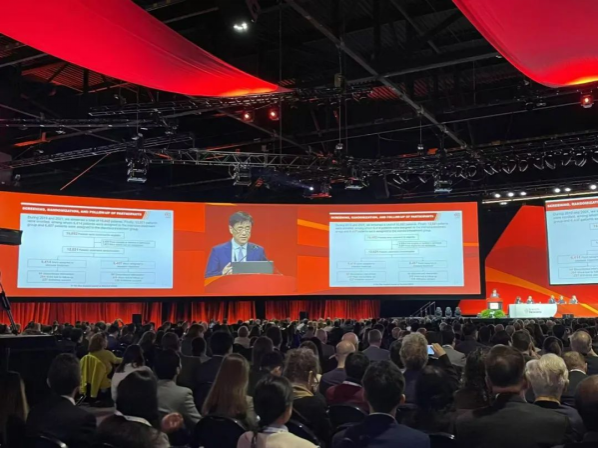On the evening of November 16, 2024, Beijing time, the centennial celebration and 2024 Scientific Sessions of American Heart Association (AHA) were held in Chicago. Ning Guang, President of Ruijin Hospital Affiliated with Shanghai Jiao Tong University School of Medicine and Academician of Chinese Academy of Engineering, presented the opening report on behalf of the research team led by Professors Wang Weiqing, Bi Yufang, and Xu Yu from the National Clinical Research Center for Metabolic Diseases. The team unveiled their groundbreaking findings from the Blood Pressure Control Target in Diabetes (BPROAD) study. Simultaneously, the New England Journal of Medicine (NEJM) published this innovative clinical research online.

The BPROAD study was featured as the opening report of the conference, signifying its monumental importance. It is the world’s first clinical trial to demonstrate the efficacy and safety of an intensive systolic blood pressure (SBP) target of less than 120 mmHg in patients with type 2 diabetes. The study provides a "Chinese solution" to the global question of optimal blood pressure targets for diabetic patients, offering robust evidence to update international guidelines and cardiovascular prevention strategies. This is also the first time Chinese scholars in the field of metabolism have presented an opening report in the major research sessions of the AHA annual conference, marking a historic breakthrough in metabolic and cardiovascular clinical research.
Dr. Dorairaj Prabhakaran, the President-Elect of the World Heart Federation (WHF) for 2025-2026, Executive Director of the Center for Chronic Disease Control (CCDC) in India, and a distinguished professor in public health and epidemiology, congratulated the BPROAD research team. He praised the study’s significant contributions to defining optimal blood pressure targets for patients with diabetes and hypertension.
The AHA Scientific Sessions is one of the most prestigious cardiovascular conferences worldwide, known for showcasing cutting-edge science and clinical practices. It spans foundational, clinical, population-based, and translational research, drawing over 18,000 attendees from more than 100 countries annually and engaging nearly 2 million healthcare professionals in lectures and discussions.
Cardiovascular disease remains the leading cause of death among patients with type 2 diabetes, making blood pressure control critical for these individuals. However, global clinical guidelines still debate the optimal SBP target for patients with type 2 diabetes and hypertension. The ACCORD trial (2010) explored blood pressure targets in type 2 diabetes but found no significant differences in cardiovascular events between intensive and standard treatment groups due to limited statistical power and interactions with glucose-lowering therapies. The SPRINT trial demonstrated a 27% reduction in cardiovascular risk with intensive blood pressure control but excluded diabetic patients.
As a landmark follow-up to ACCORD, this study focuses on intensive versus standard blood pressure control in type 2 diabetes patients with hypertension. It is the largest randomized controlled trial to date evaluating blood pressure targets, involving 12,821 participants aged 50 or older with elevated SBP and increased cardiovascular risk. Participants were randomly assigned to receive either intensive blood pressure control (SBP <120 mmHg, 6,414 individuals) or standard treatment (SBP <140 mmHg, 6,407 individuals) over a five-year intervention period. The trial was conducted across 145 research centers in 83 cities in 25 provinces of mainland China, with rigorous protocols ensuring uninterrupted intervention and data collection even during the COVID-19 pandemic. Intensive blood pressure control (<120 mmHg) significantly reduced the incidence of major cardiovascular events—including nonfatal stroke, nonfatal myocardial infarction, heart failure requiring treatment or hospitalization, and cardiovascular death—compared to standard treatment (<140 mmHg). The study highlighted the need for cautious monitoring of hypotension and electrolyte levels during intensive blood pressure management with multiple antihypertensive medications. This research provides the first solid evidence supporting intensive blood pressure control targets (SBP <120 mmHg) for cardiovascular benefits in type 2 diabetes patients. It represents a major advancement in global diabetes and cardiovascular care, reinforcing China's leading role in addressing critical medical challenges worldwide.

